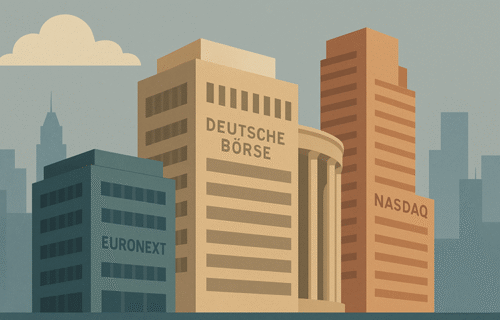Competition authorities across Europe, the UK and the United States have spent the past decade increasing oversight of stock exchange groups and clearing houses. The operators of the world’s major trading venues — including the London Stock Exchange Group (LSEG), Deutsche Börse, Nasdaq, Intercontinental Exchange (ICE) and Japan Exchange Group — have all faced antitrust or regulatory scrutiny. The pressure reflects growing concern that consolidation in trading, clearing and market-data services could limit competition and ultimately raise costs for issuers and investors.
The European Commission’s recent launch of a formal investigation into possible collusion between Deutsche Börse and Nasdaq in the Nordic derivatives market fits into a clear regulatory pattern. Authorities intervene when control over trading or clearing becomes too concentrated, particularly where market data, derivatives or post-trade services are involved.
One of the most significant confrontations occurred between 2016 and 2017, when the European Commission blocked the planned merger between LSEG and Deutsche Börse. Regulators concluded that the combined group would have dominated the clearing of fixed-income instruments in Europe, reducing competition and giving the merged entity unacceptable market power.
LSEG again came under scrutiny in 2019 when it announced its acquisition of Refinitiv. This time, the Commission focused on data and trading platforms. The deal was cleared, but only after LSEG agreed to sell the entire Borsa Italiana business, which was subsequently acquired by Euronext.
In the same period, Intercontinental Exchange in the UK faced intervention from the Competition and Markets Authority following its acquisition of Trayport, a platform central to energy-market trading. The authority determined that ICE could use control of the software to disadvantage rival trading venues and required a full divestment of Trayport, which was completed.
Regulators have also intervened when risk management and clearing infrastructure did not meet supervisory expectations. Nasdaq Clearing in Sweden received one of the largest fines ever imposed on a European clearing house after a trader default exposed weaknesses in its margining and risk processes. Although this was not an antitrust case, it marked a significant regulatory enforcement action directed at a major market operator.
Outside Europe, Japan’s Fair Trade Commission reviewed the Japan Exchange Group’s acquisition of the Tokyo Commodity Exchange in 2020. Approval was granted only after the group committed to maintaining open access for market participants.
In Germany, Deutsche Börse has faced repeated questions from competition authorities over access to market data and pricing models. While no infringement decisions have been published, monitoring continues, reflecting concerns that data fees and licensing terms could limit competition.
The latest development — the European Commission’s 2024–2025 investigation into potential coordination between Deutsche Börse and Nasdaq — is testing whether cooperation linked to a long-standing Nordic derivatives agreement may have crossed into collusive behaviour. The inquiry focuses on whether the exchanges aligned their conduct on listing, trading or clearing to reduce competitive pressure in derivatives markets. The investigation is ongoing and no conclusions have been drawn.
A clear pattern emerges from these actions: regulators see clearing and market data as strategic infrastructure for the Capital Markets Union, and they resist anything resembling single-venue dominance. Most investigations do not result in fines. Instead, they lead to blocked mergers, forced divestments or binding commitments designed to preserve choice and market access. Exchanges benefit from scale, but authorities remain firm that scale must not translate into exclusivity or reduced competition.
With the Deutsche Börse–Nasdaq case now underway, Europe signals once again that the functioning of its capital markets — and especially derivatives and clearing — will remain tightly regulated to safeguard competition.
Source: ESMA, JFTC, EC, gov.uk and CIJ.World Analysis Team
